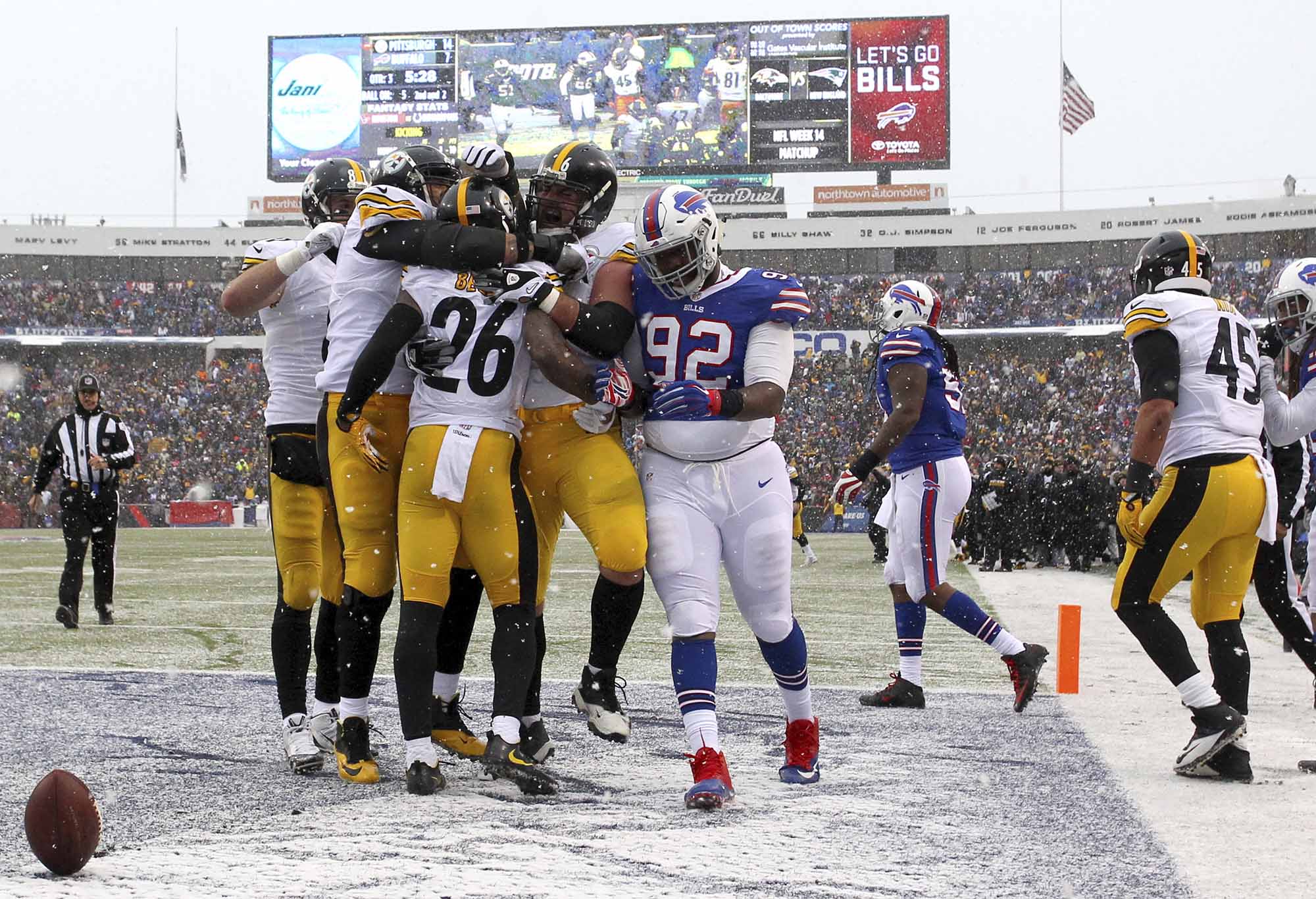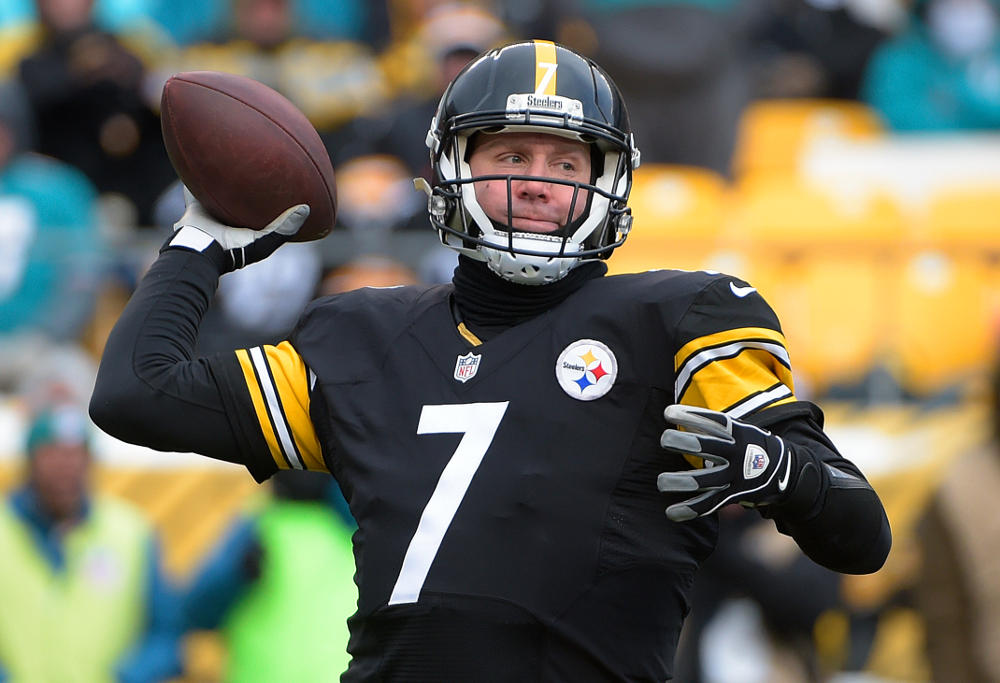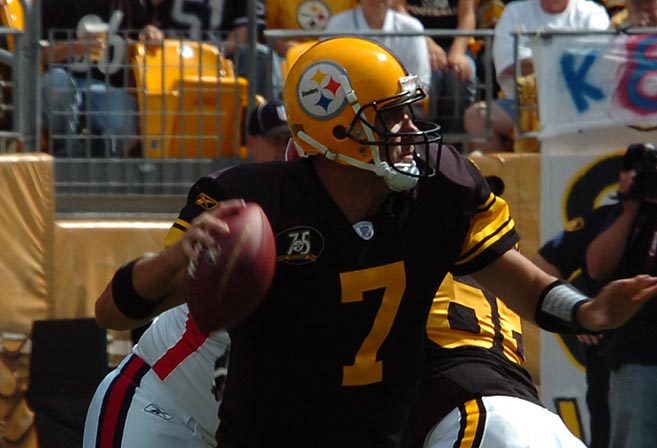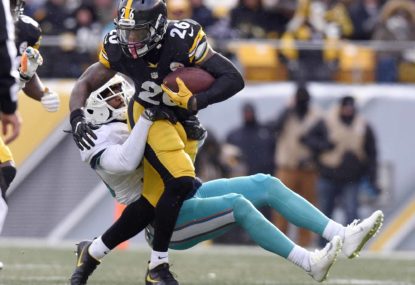Khalil Mack has been traded to the Bears. Earl Thomas reported to the Seahawks overnight. Aaron Donald got a big fat extension from the Rams. That leaves Le’Veon Bell as the only holdout left in the NFL.
Well, technically it hasn’t begun, as he’s not contracted, and the season hasn’t started. But this is akin to storm clouds at 5pm on a summer’s afternoon in Brisbane – we know what comes next.
Fan reaction to an NFL holdout rarely sides with the player. There seems to be a generally-held consensus that a player should be happy to play for a team irrespective of their contract. This probably extends to Australian sports as well, albeit to a lesser degree; the top wage-earners in sport here are dwarfed by their US counterparts.
That players earn more than most jobs and should be grateful for their remuneration, and that any further holdout is seen as “greedy”, “unsportsmanlike”, “unbecoming of a united locker room” – indeed, some of his offensive linemen have already voiced their thoughts on the matter.
I would never begrudge a sportsperson from utilising whatever (legal) means to maximise their income over the course of their (especially in the case of an NFL running back) short careers – this goes doubly for the US, the home of the ‘free market’.
There are certainly club loyalists amongst professional sportspeople, and I suppose something romantic/nostalgic about being a “one-club player”. But equally, there is nothing wrong with being a mercenary and selling your services to the highest bidder.
If you change teams more often than Australia changes Prime Ministers and follow the money, then power to you.

Pittsburgh Steelers players celebrate after Le’Veon Bell scores (AP Photo/Bill Wippert)
Le’Veon Bell is still only 26. While young as an NFL player, he is mid-career as a running back in the NFL, a position that relies on athleticism and agility to remain relevant.
He likely has one big contract left in his career, and not unreasonably wants to maximise the value of this contract. However Pittsburgh have designated him as their franchise player for the second year running, which prevents Bell from becoming an unrestricted free agent and signing with another club (either of his choosing and/or the highest bidder) for the 2018 season.
In compensation for this, the league CBA mandates he be paid $14.5m this year as this is the second straight year he finds himself in this position. Having accumulated over 400 touches last year (and ranking fifth all-time in number of touches in the first 62 games of a career), Bell is arguably one bad injury away from having any further large contract torn up.
Injured players don’t get paid, and especially so at running back.
In discussing his current predicament of having the franchise tag placed on him for a second time, it is worthy discussing two other players who have had new contract signed this offseason.
Kirk Cousins (in)famously played on two consecutive franchise tags from Washington prior to moving in free agency to Minnesota, whilst Todd Gurley recently signed a four year, $57.5m extension this offseason, easily re-setting the running back market.
The first contract is relevant as to how to successfully leverage the franchise tag into a free agency windfall. Cousins signed a three-year, $84m (fully guaranteed!) deal with the Vikings – this, of course, comes with the caveat that a quarterback a) is less likely to suffer a career-changing injury, and b) has a much longer lifespan with players still at a high level in their mid-late 30s.

One of the Steelers’ other superstars: Ben Roethlisberger (AP Photo/Fred Vuich, File)
Gurley on the other hand plays in a similar mould to Bell; a three-down back who excels both running the ball and in the passing game. It is the latter ability which is contentious for valuing these players in the free market.
Negotiations between Bell and the Steelers had come to a halt prior to this season, with each side steadfast as to why they shouldn’t bridge the gap between (underpaid) running back and receiver.
Bell has been a transcendent player at running back; not only has his unique, patient running style made him among the best in the NFL between the tackles, but he has also often been Roethlisberger’s secondary target in the passing game.
Bell argues therefore that, given his importance as a receiver, he should be entitled to payment commensurate with that position. With leading receivers in the NFL now approaching $19m/year, the $15/m he was seeking prior to the Gurley extension was not entirely preposterous.
Whether you would prefer to have Bell or Gurley as your running back in an NFL dream team is debatable, but Bell seeking $15m/year in light of the $14m+ APY Gurley received is probably more realistic now.
Pittsburgh, on the other hand, have long used an inflexible contract structure in that they do not give signing bonuses and refuse to guarantee contracts after the first year for non-quarterbacks.
Their last offer to Bell was $70m over five years, but presumably with little money up-front and more in the later (non-guaranteed) years. This obviously leaves Bell with little financial security past the first year of this contract and unable to put himself on the free market again until his early 30s unless he is cut by the Steelers.
Unfortunately with NFL contracts the devil really is in the detail, and while “$70m over 5 years” looks impressive, the cruel reality is that often a player will be lucky to make half of that, and their following contract will be much less than what they had if it was honoured to the end.
Bell clearly (rightly or wrongly) thinks he can do better on the open market, and wants to preserve his health as much as possible prior to this opportunity. Less football = less chance to be injured.

The Steelers and Ben Roethlisberger will need to rely heavily on Le’Veon Bell – if he’s there (Image: SteelCityHobbies/Wikimedia Commons.)
The stage for the holdout is now set. Pittsburgh are, in effect, paralysed; they can’t trade Bell, they can’t force Bell to report, and they can’t fine him for holding out as he’s not under contract.
They also can’t re-sign him; the date for signing Bell to a new long-term contract passed on July 16. Their only options are to either a) wait for him to report; or b) rescind the franchise tag, immediately making Bell a free agent and able to negotiate with any of the other 31 teams.
Bell needs to play a minimum of six regular season games this year for him to accrue a year under contract and be eligible for free agency next year.
In other words, this has the potential to drag on for another ten weeks. Given that Bell stands to earn $855,000 a game, he is potentially sacrificing almost $9m in salary this year to protect himself from injury and from ruining his chances for a big contract next year.
However this is very much a long-game proposition from Bell; sacrifice $9m now to make $45m+ next year.
Get ready for this to dominate NFL headlines for the rest of the week at least. In the words of Hyman Roth from The Godfather II; “This is the business we’ve chosen”.
































































































